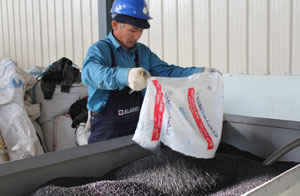AKTAU – At a recent expanded government meeting, Kazakhstan President Nursultan Nazarbayev touted the need to pool all available resources and ensure real, specific results in several priority high tech sectors. He ordered that issues with the Aktau FEZ (free economic zone) be sorted out and ineffective businesses have their contracts stripped.
A special economic zone at the Aktau Seaport was established via presidential decree 11 years ago. With an initial area of 227 hectares, the facility only had three original productions: those of Keppel, Arcelor Mittal and the fibreglass pipe production. These three plants are still there. In 2008, before construction began, another presidential decree came out expanding the FEZ area by 10 times, and dividing it into subsections. Sub-zone No. 3 has electricity, gas, water, auto and rail links. In the next year, the first sub-zone will be able to begin production, later two more sub-zones will be created.
 Twenty-four projects are currently underway at the Aktau Seaport FEZ. Five of them have already been finalised, and seven will be ready next year. More than 20 billion tenge in investments have been made in the development of the FEZ, and it gave more than 5 billion tenge in tax revenues to the budget. Companies at the FEZ receive significant tax benefits and preferences.
Twenty-four projects are currently underway at the Aktau Seaport FEZ. Five of them have already been finalised, and seven will be ready next year. More than 20 billion tenge in investments have been made in the development of the FEZ, and it gave more than 5 billion tenge in tax revenues to the budget. Companies at the FEZ receive significant tax benefits and preferences.
The already launched Aktaupolimer LLP has produced polyethylene and pre-insulated pipes of different diameters both for the housing sector and also for the oil and gas industry. This year, the plant received large orders from neighbouring regions. But while this factory and the plant that makes offshore containers are working well, the rest are barely staying afloat. Given the alignment of Keppel to Kashagan, it is working at 70 percent capacity. Arcelor Mittal is only working at 30-35 percent capacity, depending on the year. The reason is the market: everything depends on tenders.
A few years ago, large-scale construction of the factory at the Aktau Seaport FEZ was announced, but, so far, nothing has been finalised and the factory is still under construction. In 2008, at the construction launch, pharmacology was listed as a FEZ priority, namely for petrochemistry purposes. Following the amendments to the Tax Code, pharmacology became a separate branch. Therefore, the production of infusions ceased to be a part of FEZ, as a consequence, all perks were lost.
“But given the relevance of the factory and our obligations to the investor, it was re-listed as a FEZ participant starting January 1 this year,” said director of the Aktau Seaport FEZ Amirbek Tulegenov.
In fact, Kazakh investors in this project lost a few years. Equipment imported without preferences and privileges that the FEZ players are entitled cost more than they could afford. That is why imports only started in January. By the end of March, 24 containers with expensive equipment arrived in Aktau. Then, time was lost on the importation of foreign labour due to some holdbacks. The Chinese, who were to supply installation supervision, had to wait several months for their visas. But even after it is put into operation, which will be no sooner than the end of 2014, the goods must undergo a mandatory certification, which will take at least another six months. Besides, under the contract terms, from the beginning of next year, the owner of the plant will have to pay interest on the loan without even starting to produce anything.
This entire situation is further complicated by a resonant lawsuit: Samruk-Kazyna National Welfare Fund is suing its subsidiary – the pharmaceutical company, and also five supplying companies. Samruk-Kazyna lawyers seek to invalidate the contracts on the supply of medications on the seven-year contract. The future of the pharmacy company, according to its director, depends on the court ruling.
The future of tablet computer production depends on its leadership. This factory was designed to assemble not only televisions, monitors and tablet computers, but also microwave ovens and air conditioners, which are in demand in the region.
“The FEZ at the Aktau Seaport usually handles petrochemicals, machinery, transport and logistics. That plant was at one time ‘dragged’ into the FEZ for other forms of activity, but then, the contract item on ‘other activities’ was removed. Therefore, even though they are on the FEZ, they are not parties to it,” Tulegenov said.
The plant might remain in the FEZ only if it ceases to build computers in order to take up something related to the petrochemical industry.
Sixteen projects are scheduled for the Aktau Seaport FEZ in the coming years. Next year, the production of ecologically safe ship fuel will begin, as well as that of elevators, and two house-building plants will be built. In another year or two, a refinery will appear, as will factories for metal constructions, fertilizers, and a petrochemical distribution and trans-shipment complex.
